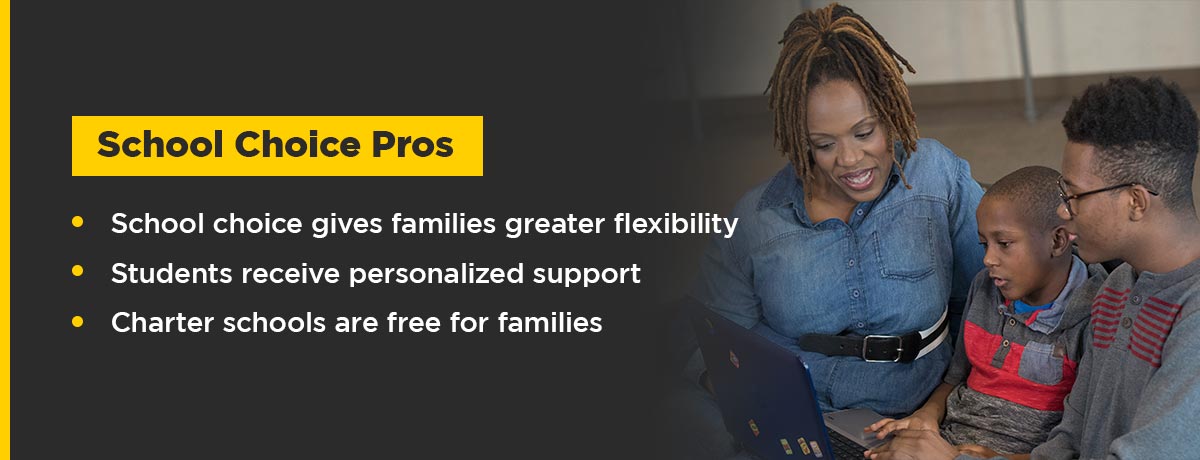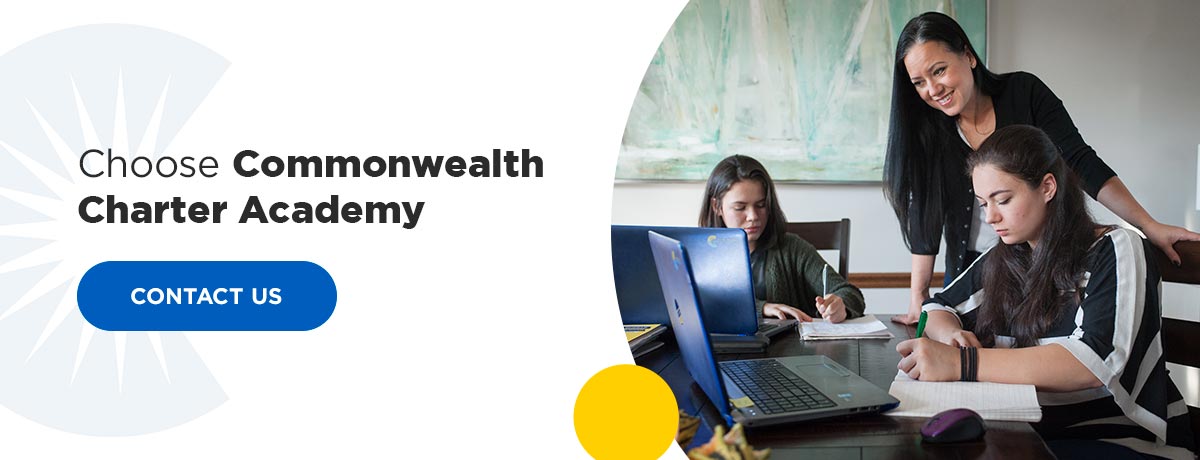Providing your child with a high-quality education is a top priority. Their academic experiences will set them up for success and guide them toward their goals. Finding the right school to support your child’s interests and needs is vital to ensuring they remain engaged and satisfied with their education.
Today, there are many routes your student can take to reach success, from traditional brick-and-mortar institutions to cyber schools. The school choice debate often leaves parents unsure of which option is best for their child. CCA is here to break down all the options and help you determine what will most benefit your child.
The School Choice Debate
The school choice debate is one of the most controversial issues in education. This topic frequents discussions in areas where traditional brick-and-mortar schools aren’t quite up-to-par and places where public schools are performing well.
Parents want the best for their children, which means finding an institution that offers an exceptional academic experience where their children can find the support they need to succeed. Sometimes the best choice is the local institution you can drive to, while other times, alternative options are superior. Either way, emotions can run high regarding this debate, and many parents wonder which side they should support.
Different Types of Schools
You should know all your available options before determining the best school system for your child. There are a few different school types you can consider, and understanding the differences can help you choose which will most benefit your family.
The different types of schools are:
- Traditional public schools: This local institution in your neighborhood receives funding from the government, and it is free for your child to attend. The proximity makes them easy for many children to attend as they can ride the bus or have parents drop them off and pick them up. However, families must adhere to zoning regulations, determining which local school the child can attend. Some rural families or those living far from the school may have a harder time getting their students to and from campus.
- Private schools: Private schools typically have a secular or religious nature and require student tuition. In these schools, administrators and teachers shape education to reflect parental views, but there can be conflicting principles between families. Some private schools may have specific requirements like uniforms or academic performance standards.
- Home school: Some parents choose to bring the school to their homes as they step into the teacher role. Parents can customize education to fit their beliefs about academics and religion. Parents must follow state regulations to ensure their children receive the same quality education they would in public schools.
- Magnet schools: These institutions are free to attend and do not have tuition requirements. Many magnet schools have a specific focus, such as the arts or science, and students occasionally need to qualify for enrollment.
- Virtual schools: These institutions operate outside of the classroom. Students can take courses at their own pace and work in a safe and comfortable environment, typically at home. These schools must follow government guidelines to reflect classroom education quality. Students will need access to certain equipment, like computers and a steady internet connection, which may or may not be included as part of the virtual school’s program.
- Charter schools: Another public school option is a charter school. Families do not need to pay tuition for their children to attend these institutions, and parents, teachers, and community members establish them rather than the state. They are not required to follow the exact federal or state requirements as other public institutions. Charter schools strongly encourage family involvement in the student’s education, and charters face high accountability regarding performance.

School Choice Cons
School choice programs support families’ right to choose what institutions their children attend. They enable parents and guardians to determine what would benefit their students rather than the state or the government. However, school choice programs have pros and cons, and many parents and officials debate whether the positives outweigh the negatives:
- School choice doesn’t improve academic performance: No evidence supports the idea that students perform better with school choice than completing public school education. Many people debate whether dedicating funds to these programs is necessary when there is little difference between academic achievements.
- Not all families can take advantage of the school choice: Not every institution supports the needs of students with learning disabilities, removing the choice from many families. Additionally, some institutions, like private schools, can still choose which students gain acceptance into the school, making it more challenging to find the right fit for the student.
- Funding follows the student: One of the most significant debate points is the monetary aspect. Some people believe school choice takes money from the public school system. This is not true, but money does play a part in the discussion. The funding follows the student. Fewer students in public schools mean less funding for that public institution.
School Choice Pros
Although there are debates against school choice, there are also many benefits. Students and families can ensure they access high-quality education and find success beyond their hometowns. These schools can be more flexible for learners and families, and students gain personalized support that enhances their academic experience:
- School choice gives families greater flexibility: Choice in schools can greatly improve flexibility for families. For instance, one school may be closer to a parent’s workplace than another. In these situations, parents can easily pick up or drop off their students or get to the school in minutes if there’s an emergency. Additionally, virtual schools can help families often on the road give their children an undisrupted education.
- Students receive personalized support: Whether your student needs additional support or the local public school system doesn’t meet your standards, students can access personalized support that guides them to success. You can ensure your student has the resources and educational services they need to perform well on coursework and find opportunities like internships and jobs that align with their interests.
- Charter schools are free for families: Charter schools offer families a reprieve from failing neighborhood schools. Enrolling your child in a charter institution can let them connect with highly qualified teachers, like-minded peers, and more opportunities to excel.
Benefits of Attending an Online Charter School
Charter schools offer immense benefits to students and families. Some charter schools, like CCA, offer the flexibility students and families need to reach success while accessing quality education you can’t find anywhere else. Other benefits of charter schools include:
- Flexible learning spaces: Students can learn in whatever way is most meaningful for them. They can attend virtual class sessions, participate in independent studies, and craft a routine that works for their schedule.
- Student-centered curriculum: Teachers collaborate with families to design and tailor a curriculum to match student learning methods, interests, and unique needs, ensuring every student gets the support they need.
- Personalized success pathways: Cyber charters let students make decisions about their education, including when and how they learn. This learning can prompt more in-depth discussions and aid in the learning process.
- Socialization opportunities: Cyber students experience a wide array of socialization experiences. CCA encourages students to attend any events they’re interested in, including some of our more than 900 field trips, school clubs and activities, and mobile classroom days.
- Student and family resources: Virtual learning is an adjustment for families, so cyber schools offer family resources to ease the transition. At CCA, we offer family mentor programs, face-to-face meetings, and weekly drop-in sessions.
- A meaningful voice: Parents have a voice in their child’s education at charter schools. CCA’s teachers and families work together to craft a meaningful education that most benefits your child. We urge parents to collaborate with us to create a balanced experience for every student.
Choose Commonwealth Charter Academy
CCA puts students first. Our mission is to deliver enriching and unique academic experiences to students across Pennsylvania. We’re a K-12 public charter school that understands every child has unique needs, which is why we deliver personalized success pathways and learning experiences to every learner.
Enrolling at CCA is easy, and your student can gain access to state-certified teachers, socialization opportunities, and a unique curriculum they can’t find at other institutions. Enroll your student in CCA today.




